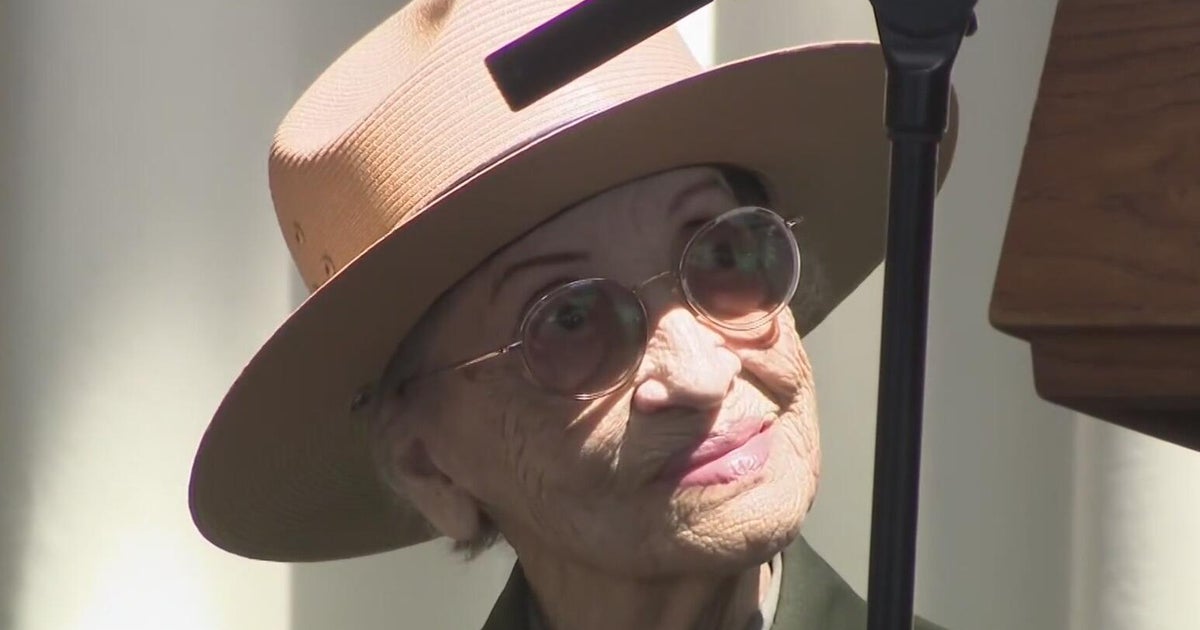President Obama Announces Debt Deal
NEW YORK (CBSNewYork/AP) -- Ending a perilous stalemate, President Barack Obama and congressional leaders announced agreement Sunday night on an emergency deal to avoid to avert the nation's first-ever financial default. The arrangement would cut more than $2 trillion from federal spending over a decade.
The dramatic agreement, with scant time remaining before Tuesday's deadline, "will allow us to avoid default and end the crisis that Washington imposed on the rest of America," Obama said. Default "would have had a devastating effect on our economy," the president said at the White House, relaying the news to the nation and to financial markets around the world. He thanked the leaders of both parties.
House Speaker John Boehner telephoned Obama at mid-evening to say the agreement had been struck, officials said.
No votes were expected in either house of Congress until Monday at the earliest, to give rank-and-file lawmakers time to review the package.
Leaders in both parties were already beginning the work of rounding up votes.
LISTEN: WCBS 880's Kelly Waldron reports
Podcast
mp3]
In a conference call with his rank and file, Boehner said the agreement "isn't the greatest deal in the world, but it shows how much we've changed the terms of the debate in this town."
Obama underscored that point. He said that, if enacted, the agreement would mean "the lowest level of domestic spending since Dwight Eisenhower was president" more than a half century ago.
Senate Democratic leader Harry Reid provided the first word of the agreement.
"Sometimes it seems our two sides disagree on almost everything," he said. "But in the end, reasonable people were able to agree on this: The United States could not take the chance of defaulting on our debt, risking a United States financial collapse and a world-wide depression."
In his remarks, Obama said there will be no initial cuts to entitlement programs like Social Security and Medicare. But he said both could be on the table along with changes in tax law as part of future cuts.
That was a reference to a special joint committee of lawmakers that will be established to recommend a second round of deficit reductions, to be voted on by Congress before year's end as part of an arrangement to raise the debt ceiling yet again. That is expected to be necessary early next year.
Pending final passage, the agreement marked a dramatic reach across party lines that played out over six months and several rounds of negotiating, interspersed by periods of intense partisanship.
A final stick point had concerned possible cuts in the nation's defense budget in the next two years. Republicans wanted less. Democrats pressed for more in an attempt to shield domestic accounts from greater reductions.
Details apparently included in the agreement provide that the federal debt limit would rise in two stages by at least $2.2 trillion, enough to tide the Treasury over until after the 2012 elections.
Big cuts in government spending would be phased in over a decade. Thousands of programs -- the Park Service, Labor Department and housing among them -- could be trimmed to levels last seen years ago.
No Social Security or Medicare benefits would be cut, but the programs could be scoured for other savings. Taxes would be unlikely to rise.
Without legislation in place by Tuesday, the Treasury will not be able to pay all its bills, raising the threat of a default that administration officials say could inflict catastrophic damage on the economy.
If approved, though, a compromise would presumably preserve America's sterling credit rating, reassure investors in financial markets across the globe and possibly reverse the losses that spread across Wall Street in recent days as the threat of a default grew.
Officials familiar with the negotiations said that McConnell had been in frequent contact with Vice President Joe Biden, who has played an influential role across months of negotiations.
In the first stage under the agreement, the nation's debt limit would rise immediately by nearly $1 trillion and spending would be cut by a slightly larger amount over a decade.
That would be followed by creation of the new congressional committee that would have until the end of November to recommend $1.8 trillion or more in deficit cuts, targeting benefit programs such as Medicare, Medicaid and Social Security, or overhauling the tax code. Those deficit cuts would allow a second increase in the debt limit.
If the committee failed to reach its $1.8 trillion target, or Congress failed to approve its recommendations by the end of 2011, lawmakers would then have to vote on a proposed constitutional balanced-budget amendment.
If that failed to pass, automatic spending cuts totaling $1.2 trillion would automatically take effect, and the debt limit would rise by an identical amount.
Social Security, Medicaid and food stamps would be exempt from the automatic cuts, but payments to doctors, nursing homes and other Medicare providers could be trimmed, as could subsidies to insurance companies that offer an alternative to government-run Medicare.
Officials describing those steps spoke on condition of anonymity, citing both the sensitivity of the talks and the potential that details could change.
The deal marked a classic compromise, a triumph of divided government that would let both Obama and Republicans claim they had achieved their objectives.
As the president demanded, the deal would allow the debt limit to rise by enough to tide the Treasury over until after the 2012 elections.
It appeared Obama's proposal to extend the current payroll tax holiday beyond the end of 2011 would not be included, nor his call for extended unemployment benefits for victims of the recession.
Republicans would win spending cuts of slightly more than the increase in the debt limit, as they have demanded. Additionally, tax increases would be off-limits unless recommended by the bipartisan committee that is expected to include six Republicans and six Democrats. The conservative campaign to force Congress to approve a balanced-budget amendment to the Constitution would be jettisoned.
Congressional Democrats have long insisted that Medicare and Social Security benefits not be cut, a victory for them in the proposal under discussion. Yet they would have to absorb even deeper cuts in hundreds of federal programs than were included in Reid's bill, which many Democrats supported in a symbolic vote on the House floor on Saturday.
As details began to emerge, one liberal organization, Progressive Change Campaign Committee, issued a statement that was harshly critical.
"Seeing a Democratic president take taxing the rich off the table and instead push a deal that will lead to Social Security, Medicare and Medicaid benefit cuts is like entering a bizarre parallel universe -- one with horrific consequences for middle-class families," it said.
While politically powerful business groups like the Chamber of Commerce are expected to support the deal, tea party organizations and others have looked disapprovingly on legislation that doesn't require approval of a balanced-budget amendment.
If they keep to that position, it could present Boehner a challenge in lining up enough votes to support a compromise, just as Obama may have to stand down rebels within his own party.
As senators began debate in a rare Sunday session prior to the announcement, Democratic leader Harry Reid said he was "cautiously optimistic'' agreement could be reached. Republican leader Mitch McConnell said earlier that negotiators were "very close.''
Still, cautioned Reid, "there are a number of issues yet to be resolved. We must understand that there's no agreement that has been made.''
Tuesday is the deadline for averting default, the day the Treasury says it will reach the limits of its borrowing authority to pay all the nation's bills.
"What would be the impact on federal payments to states? In the short run, if as part of this gridlock and this difficulty they would decide not to be timely in the federal payments to New York State, that has implications for us, particularly with regard to Medicaid," said New York State Comptroller Thomas DiNapoli.
"And the notion that for the first time in our history we would default on our obligations, result in a downgrading of the credit worthiness of the United States, is shocking," he added.
New York City Comptroller John Liu also spoke about how the city's finances could potentially be effected if a deal isn't reached in Washington. He says among other things, the city's pension will take a hit if there's no debt limit deal by Tuesday.
"Most immediately, we have over one million New Yorkers who rely on their Social Security payments and those payments are at risk if an agreement is not reached," said Liu.
"A significant number of those recipients rely on those checks as their primary source of income," he added.
Liu also said not reaching deal could also have an adverse effect on Wall Street. "If Washington does not reach an agreement by Tuesday, the U.S. could technically go into default and that would cause chaos in the financial markets," said Liu.
Liu called for a task force to look at options for the city in case no deal is complete by Tuesday. "I hope the worst-case scenario does not happen, but it's inconceivable that we're even at this point now," he said.
Assemblyman David Weprin said he too is concerned about what would happen to the economy if a deal isn't reached by the deadline date.
"The United States of America has never defaulted on their debt, they've never been shut out of the capital markets," said Weprin. "If for some reason they missed the deadline or if the major rating agencies downgrade the United States' debt, it would have fiscal implications for years to come and we really can't let that happen."
Weprin said he's particularly worried about seniors, who he said are scared about what could happen to their Social Security and other benefits.
"We need to protect the entitlement programs to protect Social Security, Medicare and Medicaid and not to balance the budget on the backs of seniors," he said.
Meanwhile, some lawmakers made the rounds on various Sunday television news shows to talk about the latest developments in the debt deal talks.
New York Sen. Chuck Schumer told CNN Sunday morning that while "there is no final agreement,'' there was a sense of relief that the two sides were finally working on a compromise plan.
Schumer later told CBS that one of the last sticking points is the creation of a "trigger'' mechanism that would hit priorities of both parties if the committee does not come up with a plan for further deficit reduction.
Among the trigger ideas being discussed are automatically reducing spending on entitlement programs such as Medicare along with closing tax loopholes or reducing defense and non-defense programs by an equal amount.
"It should be equally tough on Democrats and Republicans,'' Schumer said.
In a partisan vote Sunday, the Senate rejected an effort to advance a Democratic approach to resolving the debt issue.
The vote was 50-49, or 10 short of the 60 votes needed to move forward on legislation proposed by Reid that would have carried out $2.2 trillion in deficit reduction over 10 years while raising the debt ceiling by $2.4 trillion. The outcome of that vote did not directly affect the behind-the-scenes negotiations on a compromise.
Immediately afterward, Reid told fellow senators that while they were "not there yet,'' a vote on a possible compromise could still happen Sunday.
What do you think of this announced deal? Sound off below in our comments section...
(TM and Copyright 2011 CBS Radio Inc. and its relevant subsidiaries. CBS RADIO and EYE Logo TM and Copyright 2011 CBS Broadcasting Inc. Used under license. All Rights Reserved. This material may not be published, broadcast, rewritten, or redistributed. The Associated Press contributed to this report.)







